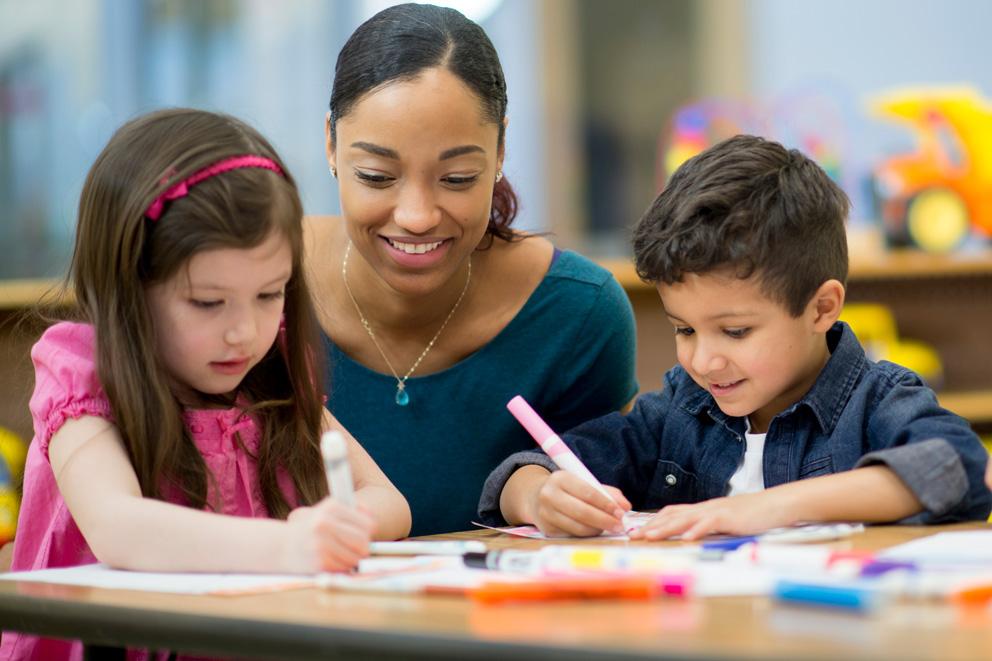
Ready or not? Stanford researchers weigh in on kindergarten preparedness
It’s that time of year for families of preschoolers: kindergarten enrollment. This milestone can be fraught with uncertainty for parents who question whether their child is prepared—socially, academically or otherwise.
What does being ready for kindergarten look like? Researchers at Stanford Graduate School of Education (GSE) have investigated this issue from all angles, offering strategies for parents and teachers to help make the transition a smooth one.
Clear expectations
First, it’s wise for parents to get a handle on what exactly will be expected of children in their particular classroom.
“Every school is different," says Ira Lit, associate professor at GSE and director of the Stanford Elementary Teacher Education Program. “But many provide opportunities for families to come and get to know the place. Parents can ask the teacher, ‘What should I know? What are some recommendations you might have?’ “
In general, says Lit, most schools expect kindergarteners to be reasonably comfortable in groups and capable of meeting basic self-care needs, such as using the restroom on their own.
“Think about the demands put on a child in that space,” he suggests. “They might need practice or guided support beforehand for the kinds of things they’re going to experience.” Children who get anxious at a birthday party, for instance, might ease into the classroom environment by participating in a pre-K program over the summer, spending part of each day with a group of 10 or so other kids.
Does age matter?
To allow more time to develop these capacities, some parents opt to postpone kindergarten enrollment for a year, even if their child’s birthday falls well ahead of the school’s cutoff date.
GSE Professor Thomas Dee says this trend has intensified in recent years. “The percentage of six-year-olds in U.S. kindergartens used to be practically zero,” he says. “It’s grown to roughly 20 percent.” Much of the increase, he says, can be attributed to the desire among parents to give their kids an academic advantage.
Dee, the faculty director of the GSE's John W. Gardner Center for Youth and Their Communities, says there’s no strong evidence that putting off kindergarten for a year boosts school performance in the long run. However, a 2015 study he co-authored did find mental health benefits: postponing kindergarten for a year dramatically reduced children’s levels of inattention and hyperactivity, improving their ability to control or modulate their behavior even into later childhood.
“A delay might be helpful if your child is struggling with self-regulation,” he offers, noting that the character of kindergarten has become more structured over the years, putting a higher premium on these skills.
Families who are concerned about whether the level of instruction will be developmentally appropriate for their child, he says, might seek out a school that favors more play-based learning over formal academics. And repeating kindergarten is always an option to consider for a child who would benefit from extra time in that environment.
Real-world practice
When it comes to preparing children for kindergarten academics, parents have an essential role to play. But many are swamped with the demands of everyday life and not even sure where to start.
It doesn’t take a lot of time, expertise or pricey tools to give your child a step up, assures Lit. “There are plenty of ways to help children with early literacy and numeracy before they go to school,” he says. “The world is full of things to read and count.” He said basic counting, letter familiarity and the ability to write your name can give a child a good start.
To equip parents with ongoing inspiration and support, former GSE Professor Susanna Loeb and Benjamin York, PhD '15, developed a text-messaging program called Ready4K. Each week the app delivers several texts with simple ideas for incorporating lessons into daily activities.
Loeb and York found texting was an effective tactic for reaching a diverse range of families: 80 percent of low-income parents in their pilot study had unlimited texting plans, making it a convenient and affordable way to connect and give tips.
Staying motivated
Learning new skills and concepts can be frustrating for young ones. Parents can help by encouraging a “growth mindset,” a term coined by Stanford psychology Professor Carol Dweck to refer to a student’s belief that intelligence and abilities are developed, not innate.
“Parents often tell their children they’re ‘smart’ when they do something well,” says Jo Boaler, a professor of education whose research focuses on mathematics learning. “That seems like a nice thing to do, but it can set kids up for problems later. When they fail at something, they’re likely to think they aren’t smart after all.”
Boaler, co-founder of youcubed.org, suggests using “growth praise” to commend children for an accomplishment—for example, “It’s great that you learned this.” And when they make a mistake, she advises, show appreciation for their reasoning.
“There’s always some logic to what they say,” she points out. “If your child multiplies three by four and gets seven, you can say, ‘Oh, I see what you’re thinking. You’re using what you know about addition to add the numbers.’ ”
Many starting points
These strategies can go a long way toward preparing preschoolers for the challenges ahead. But ultimately, says Lit, there’s no single way to define or be “ready for kindergarten,” because schools, communities, teachers and children vary so widely.
“Every child who walks in the door brings different strengths, interests and needs. It’s important to acknowledge that,” he says. “And every school should be an open and welcoming place for every family and child—it should recognize the diversity of families and kids, take them wherever they are and help them succeed.”



